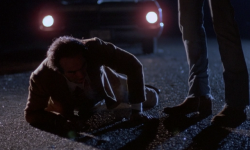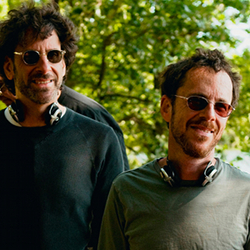
Love Will Tear Us Apart: Running in Madness, Dying in Love(1969)
Cast: Ken Yoshizawa, Yoko Muto, Rokko Toura
Director: Kôji Wakamatsu
Country: Japan
Genre: Drama
Editor’s Notes: The following review of Running in Madness, Dying in Love is a part of Rowena’s coverage of the 6th Annual Globus Film Series at the Japan Society in New York, Love Will Tear Us Apart.
Running in Madness, Dying in Love begins with a two-minute black-and-white montage of demonstrators and riot police, followed by a switch to colour and of one male protester Shihei (Yoshizawa Ken) escaping the fray and running in the streets. In this way, Wakamatsu leaves no doubt as to the sociopolitical context of the ensuing narrative. Cut to the interior of an apartment, in which the off-screen sounds of an argument between two men provide the audio while on-screen is a woman. The economy of form is astonishingly lucid, for this formal juxtaposition of an image of a woman ensnared between two men, and their respective ideologies clashing off-screen, encapsulates the narrative. This woman turns out to be Yuri (Muto Yoko), Shihei’s sister-in-law. The two men arguing are Shihei and his brother, who is a policeman. The brothers’ argument pivots around their conflicted interests and political positions. In the heat of the argument, a gun goes off. Yuri realises that she is holding the gun and is overcome with guilt and a death wish in expiation for her sin. But Shihei convinces her to flee with him to the countryside and make everything look like a suicide. As a result, Yuri and Shihei become bound to each other in guilt and death, and as their journey to flee progresses, in desire and sex.
The economy of form is astonishingly lucid, for this formal juxtaposition of an image of a woman ensnared between two men, and their respective ideologies clashing off-screen, encapsulates the narrative.
 Frequent superimpositions of the couple making love and of the snow-filled landscapes that they traverse to flee the site of the crime—accompanied by voiceovers that relate death wishes, love, desire, the history of their love thwarted by Shihei’s brother—coalesce into a mood of defiant guilt and passion. Every now and then, as if to re-anchor himself in his activism, Shihei shouts off slogans that bring together sex, love, and revolutionary fervour. In their journey through thick snow, they arrive at what they call “the end of the world.” There they discover a band of men in pursuit of a naked woman, whom they eventually take turns beating. This ritual is the village’s code of preservation against inhabitants migrating outside; in other words, against competition from industrialisation and the lure of big city life. A seemingly anecdotal sequence added in for the sake of erotica, but whose emotional impact is very much connected to the film’s underlying theme.
Frequent superimpositions of the couple making love and of the snow-filled landscapes that they traverse to flee the site of the crime—accompanied by voiceovers that relate death wishes, love, desire, the history of their love thwarted by Shihei’s brother—coalesce into a mood of defiant guilt and passion. Every now and then, as if to re-anchor himself in his activism, Shihei shouts off slogans that bring together sex, love, and revolutionary fervour. In their journey through thick snow, they arrive at what they call “the end of the world.” There they discover a band of men in pursuit of a naked woman, whom they eventually take turns beating. This ritual is the village’s code of preservation against inhabitants migrating outside; in other words, against competition from industrialisation and the lure of big city life. A seemingly anecdotal sequence added in for the sake of erotica, but whose emotional impact is very much connected to the film’s underlying theme.
Shihei and Yuri continue their travels by train, boat, and foot, until they glimpse someone who may be Shihei’s brother: an apparition, look-alike, or the brother himself who survived? The unexpected conclusion brings to a full circle, narratively and formally, what was arguably from the very beginning a story about the place of women in revolutionary politics. The conclusion ultimately hollows out Shihei’s talk of revolution and also lays bare the masculinist impotence of such revolutionary ardour and politics. For in the end, he does not, or cannot, do anything for Yuri. A very tragic film, for the violence against women is neither gratuitous nor titillating, but a way to denounce and delegitimise the patriarchal structure of marriage and community.
Related Posts
![]()
Rowena Santos Aquino
![]()
Latest posts by Rowena Santos Aquino (see all)





























